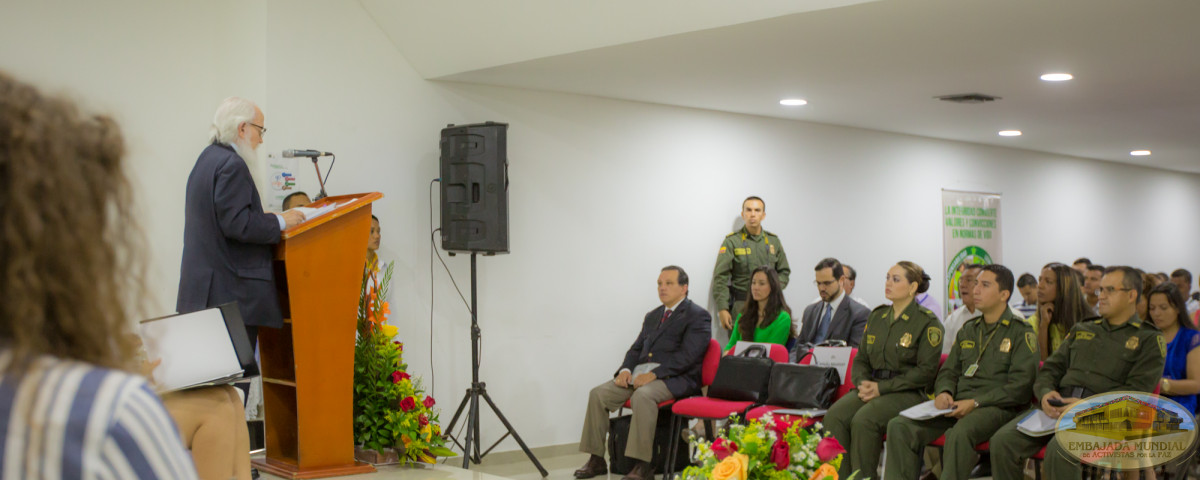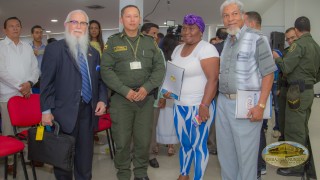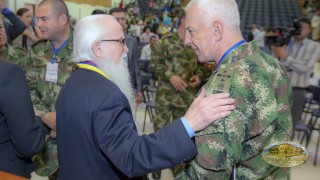Monteria - Colombia, commemorates the World Day for International Justice
The past July 22nd, the National Judicial Forum “Human Dignity, Presumption of Innocence and Human Rights,” was carried out in commemoration of the World Day for International Justice, in the Auditorium of the Metropolitan Police in the city of Monteria in Columbia.
The main table consisted of the colonel Jesus Rodolfo Diaz, Commander of the Metropolitan Police of Monteria; Dr. William Soto Santiago, executive president of the Global Embassy of Activists for Peace (GEAP); Ivan Sarmiento, national coordinator of the GEAP in Columbia; Dr. Camilo Montoya, international coordinator of the Program “Justice for Peace;” and the lieutenant Angela Soto, coordinator of the Human Rights Office of the Metropolitan Police of Monteria.
Mr. Colonel Jesus Diaz was in charge of the welcoming words for the people that assisted, who emphasized the fundamental role that the members of their institution will have in the process that will be carried out in Columbia at the root of signing the agreements of peace.
Transitional justice, Social State of Right, genocide, and ecology of peace, as transcendental topics in the stages of post conflict
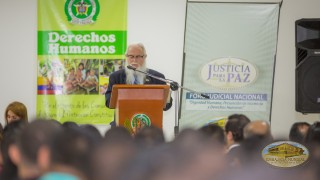
Dr. William Soto Santiago was in charge of the first intervention, who referred in his presentation the importance of detecting warning signals to prevent genocide, always emphasizing that the work of prevention is carried out from educational values.
«We cannot ignore the warning signals; because if we ignore them, when we come to realize it, genocide will already be perpetrated. And let’s remember that Justice always comes after a crime has been committed, to penalize, but no one returns the lives sacrificed.» -Dr. William Soto Santiago.
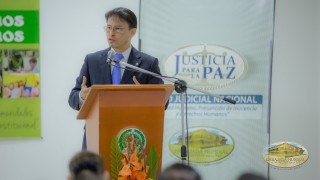
Dr. Camilo Montoya, made a historic outline with characteristics about the different models in the existing State, to conclude that Justice is a foundation of peace in the Social State of Right; and that is equally important to keep mind that without truth there is no justice.
«Columbia has its own conditions and characteristics. This agreement that is being carried out has some sui generis characteristics, which also makes the transitional justice of Columbia have some special characteristics.» -Dr. Camilo Montoya Reyes.
For Dr. Maria Cielo Linares, transitional justice has five components, the first of them is penal persecution, followed by truth and memory, the compensation to the victims and the institutional reforms; but above all, with a guarantee of no repetition.
«The transitional justice (...) it is not a distinct justice, it seeks human dignity, it seeks to protect that. What happens with transitional justice is that it is applied in the special contexts in the national convulsion, that requires exceptional steps.»
Superintendent Carlos Pacheco Castro, in his participation on “Transitional Justice in Columbia,” emphasized that peace needs to be long lasting, sustained in the time by the State. It must seek the restoration of the social network and not only in the retributive model or application of the act and penalty, which would leave the victim a side, a situation that needs to avoided in the case of the transitional justice.
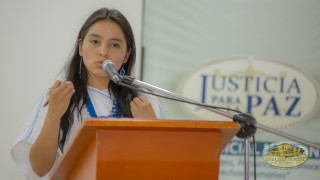
The last intervention was in charge of indigenous leader Ati Quigua, who in her presentation on “Ecology of peace and ethnocide” made a call for the disposition and intercultural dialogue, the acknowledgment of juridical pluralism and good relations among the special indigenous jurisdiction and the ordinary jurisdiction.
For her, the difficulties of the indigenous people eradicate in the full acknowledgment of their rights so that they are seen as a community, with importance in their territories.
«To acknowledge the armed conflict is a very important step; but I believe that the foundation for a country will be to recognize the environmental conflicts.»

The objectives of the Program “Justice for Peace,” highlight the importance to examine justice head on and strengthen its independence, autonomy, and effectiveness, concluding that it is necessary to make an analysis of respect to human dignity, the presumption of innocence, and the characteristics of transitional justice in the Colombian context.
